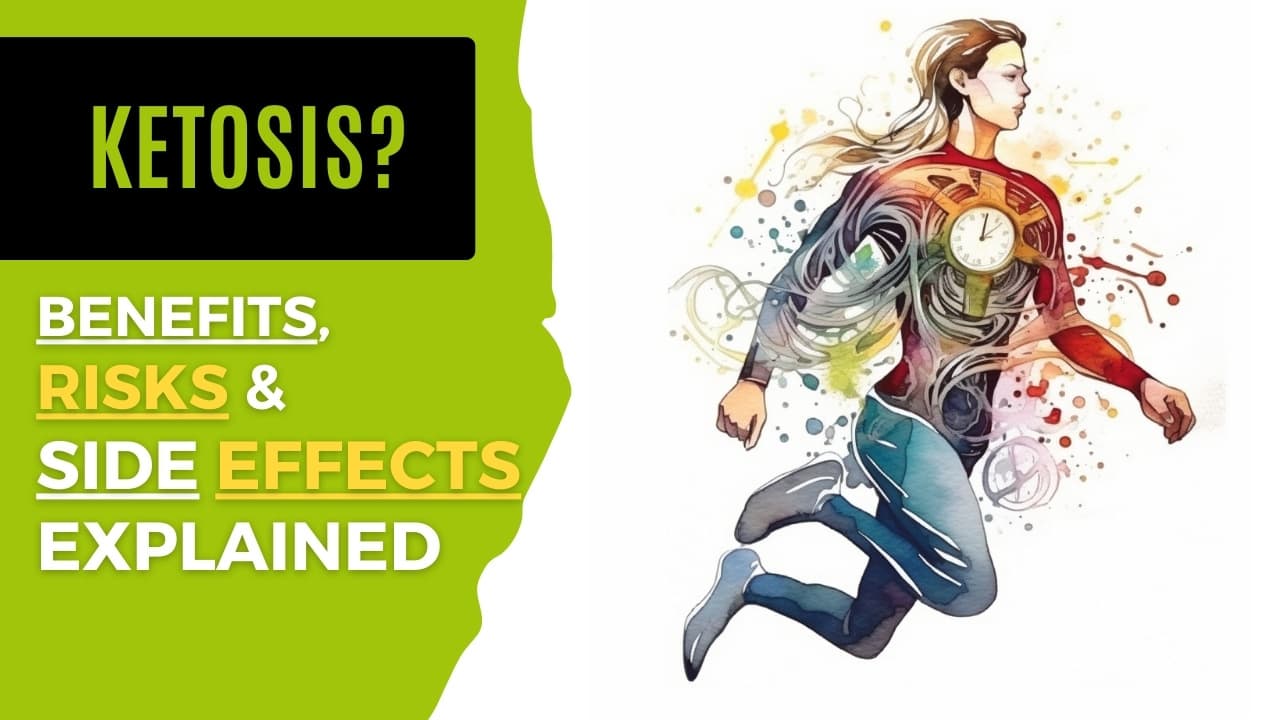
Uncovering the Keto Diet Side Effects

The ketogenic (keto) diet is quickly becoming famous across the globe due to the belief that it can help one lose weight and boost the body’s health. This means that one can eat a large amount of fat and limited Carbohydrates in an attempt to alter the body’s metabolism to adopt the process of burning fats.

However, like the case of diets in general, it has advantages and disadvantages or, in this case, side effects. In this blog post, we will reveal what keto diet side effects may be when explaining how to follow this popular diet correctly at Nutrient.
Key Takeaways
Keto flu refer to some reactions that may occur in the body when an individual begins following a ketogenic diet and such reactions include headaches, irritability, dizziness among others and such reactions are due to decrease intake of carbohydrates and hence the solution is to increase increase the intake of electrolytes and reduce consumption of carbohydrates gradually.
Some side effects that may be experienced on keto include constipation, diarrhea & nausea. These can be controlled through water intake and inclusion of fiber containing foods.
Keto diet may have positive effects on some cardiological aspects, however, it should be tried only under strict supervision of the physician as it is considered unsafe for sustainable long-term use & may lead to weight gain on its withdrawal.
Truth About Keto Flu

The most prevalent symptom associated with ketosis early on is perhaps the quite famous keto flu. Keto flu is a condition that occurs perhaps 3 to five days into a ketogenic diet plan due to the body’s symptoms of ketosis, and it presents different signs including headache, fatigue, and nausea among others.
Keto flu is mainly as a result of electrolyte abnormalities and dehydration. But if one eats more of the electrolyte and begins to gradually cut on the carb intake, then one should not experience this much. Usually, the symptoms of the low carb flu diminish after 2-3 days, and people can proceed with the ketogenic diet.
Gastrointestinal Challenges on Keto

Adverse effects related to the use of low-carbohydrate diets, particular the followers of the ketogenic diets-one of low-carb diets- suffer from gastrointestinal complications. Coated tongue, halitosis, constipation, diarrhea, and nausea could be as a result of non-availability of high fiber foods and increase in fat intake because of low carbohydrate diet. However, it is possible to lead these problems characterized by discomfort with assistance here are ways on how this can be done:
Minimizing the intake of unhealthy carbohydrates and listening to the body’s hunger cues by drinking adequate water, consuming healthy fats and proteins, and limiting the amount of net carbs consumed in a day can help manage Gastrointestinal symptoms and hypoglycemia.
The Impact on Kidney Health
However, there are some cloudy horizons as well when it comes to the effects of the keto diet on kidneys. It has been identified that despite some people regarding the keto diet as healthy, it may lead to the deterioration of kidney wellness, loss of kidney functionality, increased cases of hyperlipidemia, and formation of kidney stones.
People with renal disease or on a high protein diet should be cautious on their intake of the products. Therefore, seeking advice from a nutritionist or a doctor before going on a keto diet is quite encouraged, especially if the main objective of the diet is for weight loss.
Keto diets also have certain drawbacks: during the burning of ketones as the source of energy, the body loses its water impetus, and the level of electrolyte is altered. Periodic with the turn to the low carbohydrate, glycogen is taken out of the body and since glycogen holds water, one could lose weight fast from water loss in the first week.
And to refill the electrolytes with minerals foods and/or mineral supplements is but simple to stop these complications. It advised to intake more water and electrolyte balance so that you will not be much struggle in switching to the keto diet.
Mood Swings and Mental Health

As of mood and mental health, the keto diet may have effects. Some potential effects include:
Reduced levels of serotonin which is due to low levels of carbohydrates for instance may cause one to have low moods.
Negative effects on sleep
Negative effects on appetite
Impacts on health and general quality of life
Some people observe that their minds become sharper and they can concentrate better on the keto diet; on the other hand, some develop mood swings and sleeping disorders.
Such changes should be closely observed and in cases where they are needed, one should seek the help of a health care provider, especially since mental health is proven to be an important contributing factor to a person’s well-being.
Exercise Performance and Muscle Loss
So, when it comes to performance during exercise, the ketogenic diet also called the keto diet for short, is both a boon and bane. The studies showing that ketogenic diet could improve performance, it has been observed that it increases the performance at the submaximal intensity and decreases the exercise economy in endurance athletes. Thus, it could be reasoned that aerobic training activities might not be affected, but high-intensity activities, which are dependent on the anaerobic energy systems, could be.
Additionally, it is also observed that muscle masses are reduced even when a person on a keto diet also engages in resistance training. Strengthening exercise and enough clear protein intake is badly necessary to avoid losing muscular tissues while following this diet.
Nutrient Deficiencies on Keto

The fruits and vegetables are restricted in the keto diet that result in inadequate dietary intakes of folate, thiamin, vitamins A, B6, B12, C, E, and K.The following keto-friendly whole foods might be part of your low carb solutions to keep a check on nutrient deficiencies: avocado, spinach, chia seeds and others.
However, supplementation could be required to secure proper intake of every single indispensable vitamin and mineral. It is advisable to consult a health care provider regarding any supplement intake as a result of these findings.
Heart Health Concerns

Controversy still surrounds how the use of the keto diet affects the quality of heart health. Even though such products as olive oil and avocados contain fats that are beneficial to the heart, high amounts of saturated fats in dairy products and meats are likely to elevate the risk of heart disease. However, the keto diet can also assist to reduce fat storage which is another big pro of this diet.
The best approach during keto diet is to manage the cholesterol levels and other cardiac risk indices frequently as well as consult a doctor for routine cardiac checkups.
Hormonal Changes and Menstrual Irregularities
Fluctuations in the users’ hormone levels and alteration in their menstrual cycles are among the downsides of performing the keto diet. This is caused by the hormonal change or loss of estrogen usually precipitated by rapid weight loss, skipping of meals, and participation in sports.
On the other hand, the study on the effects of the keto diet indicates that the diet has the ability to positively impact on levels of the reproductive hormones in women suffering from PCOS, thereby improving fertility. Individuals with hormonal issues or those who have problems with their menstrual cycle should consult a doctor before going on the keto diet.
Long-term Sustainability and Weight Regain

The claim made is that ketogenic diet can be consumed for the long term while the reality is quite the opposite. This makes people to relapse to their previous unhealthy eating habits thereby causing the pattern of losing and gaining weight over and over called yo-yo dieting. These studies suggest that dieting cycling is known to lead to increase in abdominal fat and activities related to diabetes.
It is imperative to attain a configuration of food that could act as a diet for a longer term and lose weight and at the same time ensure it is nutritious according to one’s choice.
Who Should Avoid the Keto Diet?
This again goes to the point that the keto diet may not be good for everyone. It is essential to exclude the keto diet if an individual had or has eating disorders, pancreatic, thyroid, liver, or gallbladder disease.
Besides, those diagnosed with diabetes should be careful because they can easily get hypoglycemia, a dangerous low level of glucose in the blood. It is also recommended that women especially pregnant and nursing mothers avoid the keto diet due to its lack of important nutrients that are needed in their diets.
Summary
All in all, the application of the keto diet may be useful for weight loss and for general improvement of one’s health but may also pose various effects and repercussions. Knowledge of these adverse effects and taking appropriate measures when going for ketogenic diet will assist one in managing it efficiently. Last but not least, any changes to the diet should be discussed with a doctor and the focus should be placed on the health benefits, not the weight loss.
Frequently Asked Questions
What are the negative effects of a keto diet?
The diet would result in side effects such as; constant tiredness, low blood pressure, intestinal issues, poor micronutrient status, higher risk of heart ailments, kidney stones, and social isolation or even eating disorders. Moreover, it should not be enjoyed by persons with pancreas, liver, thyroid, or gallbladder health issues.
How long is it safe to be in ketosis?
Typically, ketosis is safe if you maintain the state for up to six months; however, its effects as viewed after this duration are still not well understood.
What are the first side effects of the keto diet?
Some people experience the first side of a keto diet as ‘keto-flu’ and they give the below symptoms; nausea, constipation, headache, flu-symptoms, sugar cravings, lack of water, stomach upsets, kidney stones, low performance in athletic, low Hodges, and vitamin-mineral deficiency, and weight gain.
What is keto flu, and how can I minimize its symptoms?
Keto flu is a short-term side effect of the transition to ketosis that can result in a headache, fatigued feeling and nauseous. Thus, to control these symptoms, adjusting the amount of electrolytes and a slow carb diet is advised.
How can I manage gastrointestinal issues on the keto diet?
Control gastroenterological problems on keto diet by incorporating fiber containing foods such as Chia seeds, ground flaxseed and green-leaved vegetables and intaking adequate water.
Comments (0)
Add comment
Your email address will not be published. Required fields are marked *
You May Also Like

Considering going about a ketogenic diet? Be cautious of the keto flu that is commonly known! Oh no, don’t worry, AllAmerican Payday is here for you. In this blog post, we will discuss what keto flu is, its causes, symptoms, and how people can manage...

Considering going on the keto diet? Because it is crucial to comprehend the “ketosis benefits risks side effects” in the first place. Thus this guide will cover the benefits of the diet including effectiveness in reducing weight, boosting concentration, among others as well as the...




